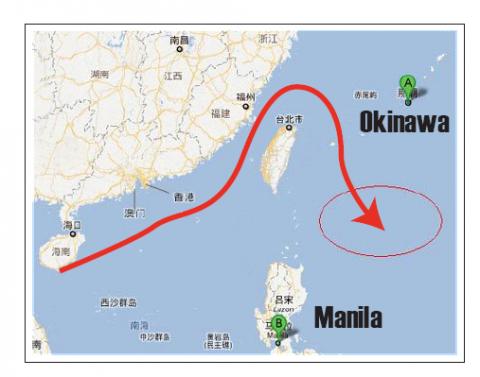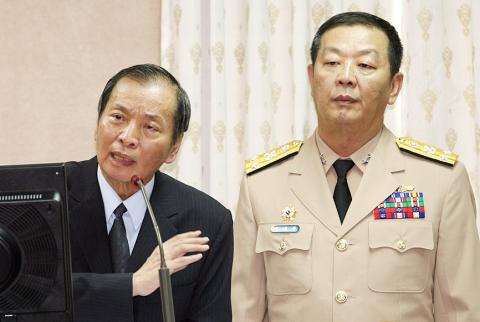The Ministry of National Defense is paying close attention to ongoing maneuvers southeast of Taiwan by a fleet of Chinese navy vessels that includes one of the heaviest combat ships in the People’s Liberation Army Navy.
According to Japanese media, the Japan Self-Defense Forces first spotted the group of five Chinese vessels 650km southwest of Okinawa on Sunday after they had crossed the Strait of Miyako.
The five vessels from the Chinese navy’s South Sea Fleet — Type 052B destroyers Guangzhou and Wuhan; Type 054A frigates Yulin and Chaohu; and Type 071 landing platform dock (LPD) Kunlun Shan — left from Hainan Island and entered the Taiwan Strait, before making a right turn about 180km off Taiwan.

At 18,000 tonnes, the Kunlun Shan is one of the largest combat vessels in the Chinese navy. The LPD, which can support a reinforced battalion of as many as 800 marines and can carry landing craft and medium-sized helicopters, took part in anti-piracy operations in the Gulf of Aden in 2010.
After entering the Pacific, the vessels conducted tactical formation and helicopter training missions in international waters about halfway between Taiwan and the main Philippine island of Luzon.
Aside from a Taiwan contingency, Chinese LPDs could play a crucial role in operations in the South China Sea against countries such as the Philippines and Vietnam, with which Beijing has become embroiled in disputes over contested islets.

Photo: CNA
Commenting on the developments, Deputy Minister of National Defense Chao Shih-chang (趙世璋) told the legislature’s Foreign Affairs and National Defense Committee yesterday that the ministry was closely monitoring the Chinese fleet and that it would continue to pay attention to its movements.
“Because the fleet is in international waters, its presence does not threaten Taiwan’s security for the moment,” he said.
Chao said the ministry believed the Chinese fleet was on a routine training exercise and that it was normal for any country to train their navy in international waters.
An unnamed navy official told the Chinese-language Liberty Times (the Taipei Times’ sister newspaper) that the navy was studying the fleet’s intentions and monitoring whether it would -return to China by the same route or move to another area.
The rapidly modernizing Chinese navy has increased the frequency of its sorties in recent years. A number of those, the latest in February, have made encirclement-like maneuvers around Taiwan.
Many sorties have also taken Chinese vessels to waters near Japan and beyond the first island chain, which Beijing regards as an artificial line preventing it from breaking out as a sea power.
On April 29, three Chinese warships — Type 054A frigates Zhoushan and Xuzhou; and the electronic reconnaissance and missile tracking ship Beijixing — were seen 430km west of the Japanese island of Yakushima in Kagoshima Prefecture. It was the first time in nine years that Chinese navy vessels had passed through the Osumi Strait, which serves as a main transit route for the US Seventh Fleet.
Late last month, the Japanese military reported that Japan Air Self-Defense Force fighter aircraft were scrambled 156 times in response to Chinese naval aircraft approaching Japanese airspace last year, a record high since the Japanese military started releasing such data by country in 2001.
Japan said that flight patterns by Chinese aircraft had diversified, with intelligence-gathering planes becoming increasingly involved.
Additional reporting by Rich Chang

US President Donald Trump yesterday announced sweeping "reciprocal tariffs" on US trading partners, including a 32 percent tax on goods from Taiwan that is set to take effect on Wednesday. At a Rose Garden event, Trump declared a 10 percent baseline tax on imports from all countries, with the White House saying it would take effect on Saturday. Countries with larger trade surpluses with the US would face higher duties beginning on Wednesday, including Taiwan (32 percent), China (34 percent), Japan (24 percent), South Korea (25 percent), Vietnam (46 percent) and Thailand (36 percent). Canada and Mexico, the two largest US trading

AIR SUPPORT: The Ministry of National Defense thanked the US for the delivery, adding that it was an indicator of the White House’s commitment to the Taiwan Relations Act Deputy Minister of National Defense Po Horng-huei (柏鴻輝) and Representative to the US Alexander Yui on Friday attended a delivery ceremony for the first of Taiwan’s long-awaited 66 F-16C/D Block 70 jets at a Lockheed Martin Corp factory in Greenville, South Carolina. “We are so proud to be the global home of the F-16 and to support Taiwan’s air defense capabilities,” US Representative William Timmons wrote on X, alongside a photograph of Taiwanese and US officials at the event. The F-16C/D Block 70 jets Taiwan ordered have the same capabilities as aircraft that had been upgraded to F-16Vs. The batch of Lockheed Martin

GRIDLOCK: The National Fire Agency’s Special Search and Rescue team is on standby to travel to the countries to help out with the rescue effort A powerful earthquake rocked Myanmar and neighboring Thailand yesterday, killing at least three people in Bangkok and burying dozens when a high-rise building under construction collapsed. Footage shared on social media from Myanmar’s second-largest city showed widespread destruction, raising fears that many were trapped under the rubble or killed. The magnitude 7.7 earthquake, with an epicenter near Mandalay in Myanmar, struck at midday and was followed by a strong magnitude 6.4 aftershock. The extent of death, injury and destruction — especially in Myanmar, which is embroiled in a civil war and where information is tightly controlled at the best of times —

China's military today said it began joint army, navy and rocket force exercises around Taiwan to "serve as a stern warning and powerful deterrent against Taiwanese independence," calling President William Lai (賴清德) a "parasite." The exercises come after Lai called Beijing a "foreign hostile force" last month. More than 10 Chinese military ships approached close to Taiwan's 24 nautical mile (44.4km) contiguous zone this morning and Taiwan sent its own warships to respond, two senior Taiwanese officials said. Taiwan has not yet detected any live fire by the Chinese military so far, one of the officials said. The drills took place after US Secretary